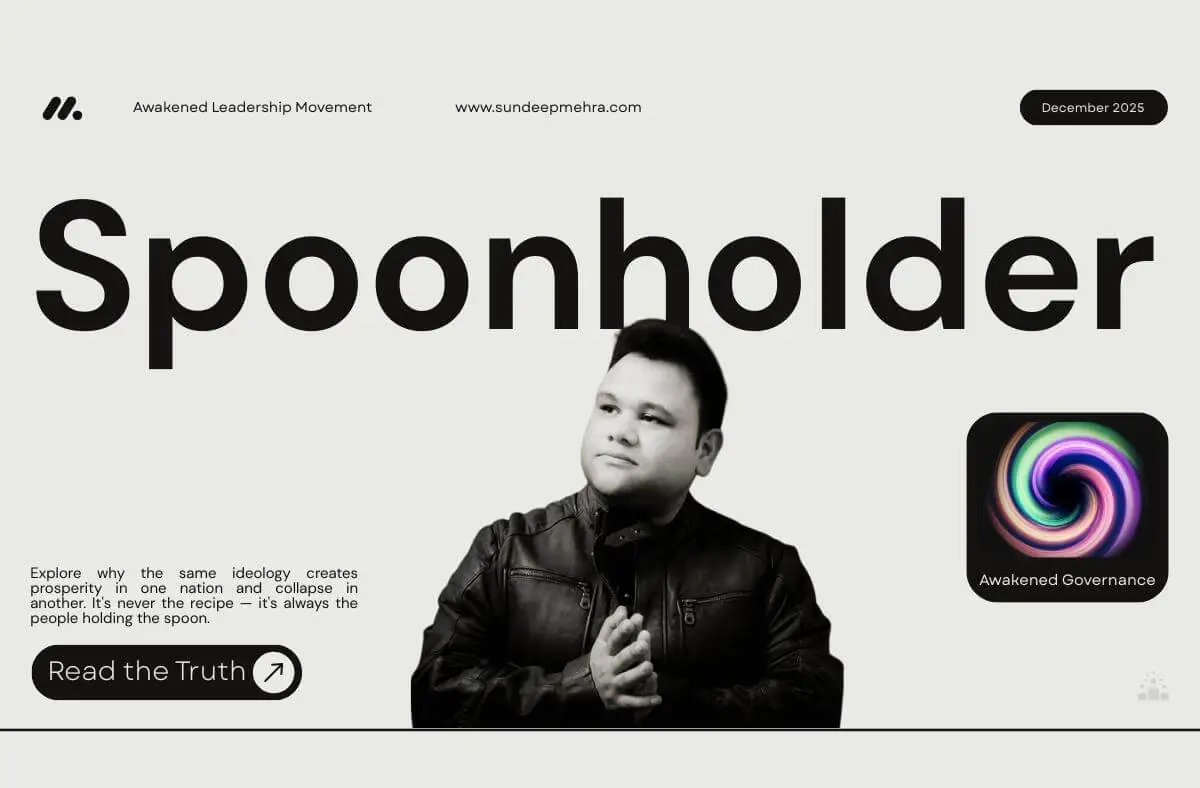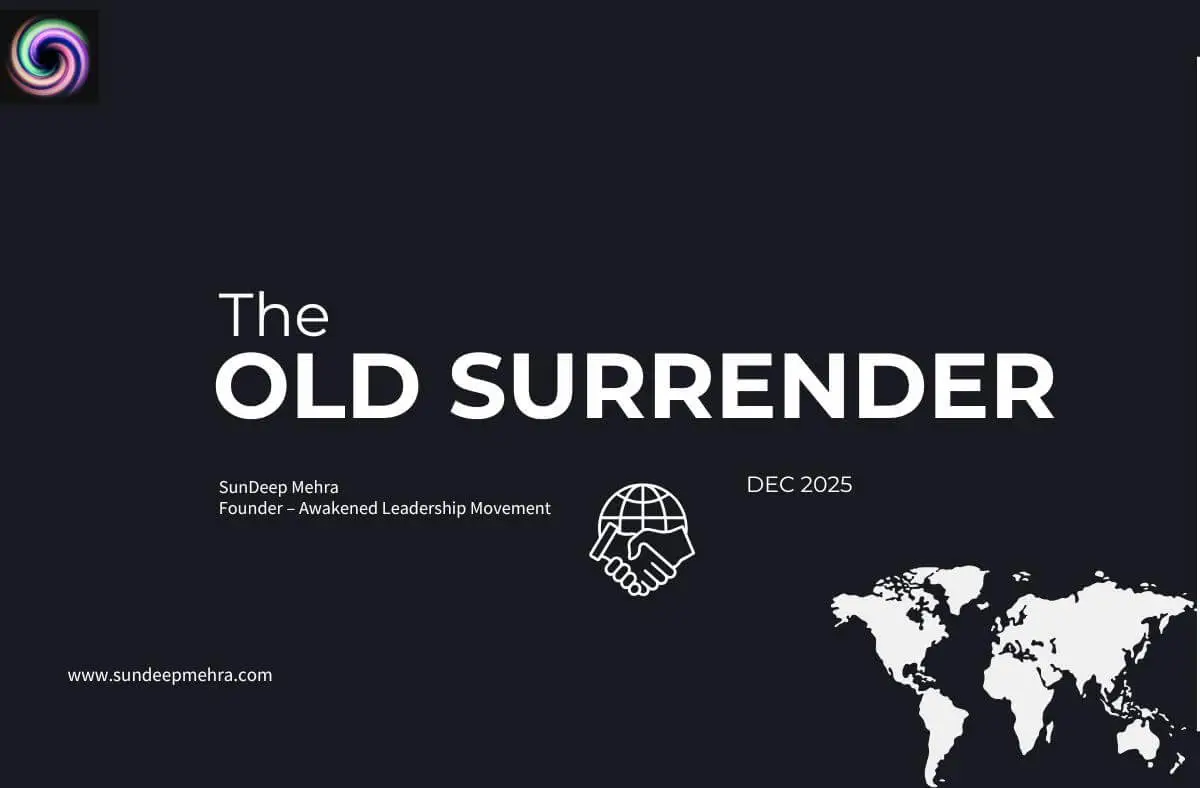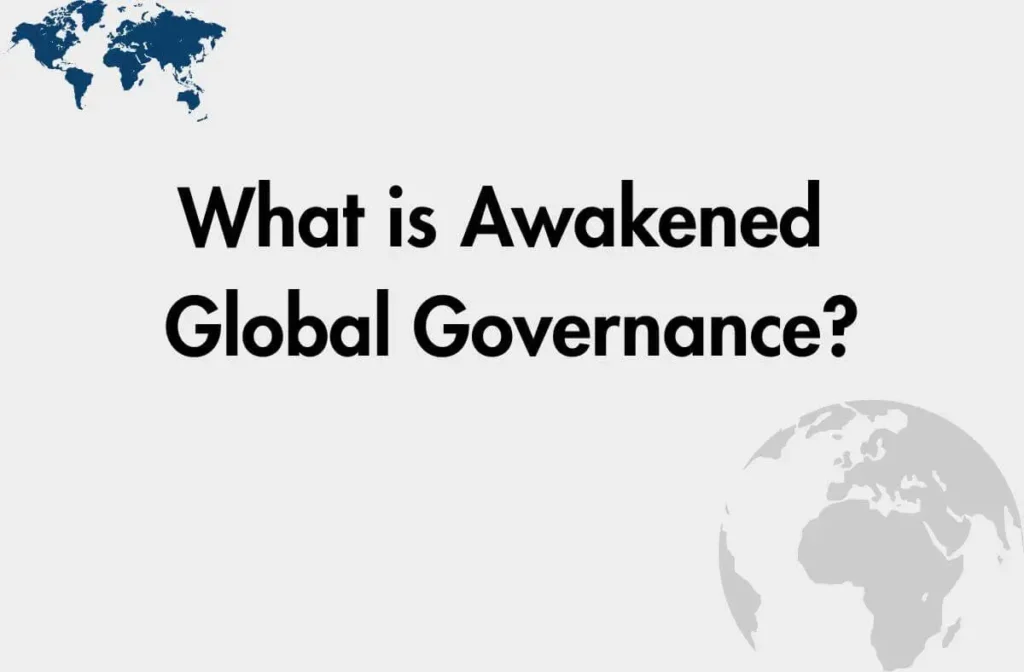
Introduction: The Need for Awakened Global Governance
Global governance has emerged as one of the most decisive forces of our time. It represents the collective order through which nations, institutions, civil society, and transnational actors respond to challenges that no state can resolve alone. Climate change, pandemics, financial instability, mass migration, security threats, and ecological collapse all exceed the capacity of any single government. Addressing them requires shared frameworks, coordinated rules, and trusted mechanisms that transcend borders.
Yet the current architecture of global governance shows deep fractures. Institutions issue declarations that often fail to transform realities on the ground. Treaties are negotiated, but compliance is inconsistent and enforcement weak. Cooperation collapses into competition, with powerful actors shaping outcomes in their own favor while collective interests fade into the background. The result is a fragile system where humanity’s most pressing crises are met with fragmented responses, leaving nations, institutions, and citizens vulnerable.
Awakened Global Governance enters here as the next step in evolution. It is not limited to agreements or summits but becomes a living system of clarity, conscience, and collective alignment. Rooted in the depth of Awakened Leadership and extended from Awakened Governance, it reimagines the way global systems operate. It seeks not only to regulate interdependence but to embody fairness, soul, vision, and responsibility in every process — from dispute resolution and international trade to human rights protection and environmental restoration.
Where conventional global governance has relied on procedures, Awakened Global Governance calls for presence. Where institutions have been content to manage crises, this awakening insists on reshaping the structures themselves so they can sustain human life, protect dignity, and create coherence across nations. It is governance on a planetary scale that does not simply respond to problems but carries the soul and intelligence to guide civilization toward balance, trust, and shared purpose. At this scale, governance & leadership become inseparable — institutions, nations, and leaders acting together as one field of responsibility.
Defining Awakened Global Governance: Beyond Institutions, Treaties, and Summits
Global governance has long been equated with the machinery of international organizations — treaties negotiated in distant halls, summits staged on rotating stages, and declarations carefully worded to maintain fragile consensus. Yet behind these rituals, the true weight of global crises often remains untouched. Agreements may be signed, but forests continue to fall. Institutions may convene, yet wars persist. Civil society may gather, but the structures that shape power and resources remain unchanged.
Awakened Global Governance steps beyond this surface. It is not a performance of cooperation but a living architecture that grounds decisions in conscience, fairness, and shared vision. Rather than relying solely on institutions to hold the center, it creates a field where nations, organizations, governments, and communities operate from alignment — a governance that breathes with presence, truth, and soul, rather than hides behind procedures and formalities.
The Shift from Representation to Responsibility
Traditional global forums often represent the interests of states or blocs; they mirror negotiation more than resolution. Awakened Global Governance reframes the question: not “who speaks for whom” but “who stands accountable to life itself.” This responsibility transcends borders and ideologies, binding all actors — governments, markets, civil society, and knowledge systems — to a common ethic of stewardship.
Beyond Compliance to Coherence
Where conventional frameworks measure success by the number of signatures or the elegance of drafted clauses, awakened governance looks to coherence: are systems aligned with the survival, dignity, and flourishing of people and the planet? This coherence requires deeper honesty in trade policies, transparency in financial systems, integrity in climate action, and courage in peace negotiations.
A Living Ethic at the Center
Awakened Global Governance recognizes that documents and declarations alone cannot safeguard humanity. What sustains order is not the thickness or virality of agreements but the ethics, truth, and human values carried into action. When that ethical intention is alive — when human rights are protected without exception, when ecological balance is treated as non-negotiable, when cooperation is driven by purpose rather than rivalry — governance moves from abstraction into embodiment.
Watch Explainer:
The Core Anchors of Awakened Global Governance
Awakened Global Governance does not operate on documents alone. Its strength lies in anchors that bring coherence to global systems, guiding states, institutions, and societies to act with both purpose and clarity. These anchors integrate the practical demands of governance with the deeper ethic of presence and responsibility.
Inner Vision: A Compass for Civilization
Global governance must begin with clarity of direction. Inner Vision asks: What is the future we are shaping together? In practice, this means long-term strategies for climate stability, equitable trade, security, and human rights. It turns summits and declarations into more than words by embedding foresight into every decision, ensuring that collective choices build toward a horizon where humanity and the planet thrive.
Heart-Centered Alignment: Trust in the Global Arena
The legitimacy of global governance depends on trust. Heart-Centered Alignment ensures that policies, treaties, and mechanisms reflect fairness, respect, and dignity. Whether in migration compacts, human rights conventions, or financial accords, this anchor demands that the voices of vulnerable populations are not sidelined. It transforms diplomacy into cooperation grounded in awakened conscience rather than power imbalance.
Life’s Essence: Adaptive Governance for a Turbulent World
Global systems collapse when they cannot adapt. Life’s Essence equips governance with resilience — the ability to adjust to pandemics, economic shocks, conflicts, or ecological collapse without abandoning principle. It insists on flexibility paired with integrity, so that the mechanisms of global cooperation remain relevant in moments of crisis and do not fracture under pressure. It brings co-creation as an essential element of global governance.
Materiality: Turning Vision into Reality
The effectiveness of global governance is measured not by resolutions passed but by realities lived. Materiality grounds agreements into tangible outcomes: climate treaties that reduce emissions, trade rules that protect workers, financial systems that prevent exploitation, and justice mechanisms that hold violators accountable. It closes the gap between promise and practice, ensuring that governance is felt in daily lives across nations.
A Living Foundation
Together, these anchors form the living foundation of Awakened Global Governance. They integrate vision with accountability, ethics with structure, and soul with system. In doing so, they move governance from being a stage of negotiation or manipulations to becoming the architecture of collective survival and shared progress of human civilization.
The Living Rhythm of Awakened Global Governance
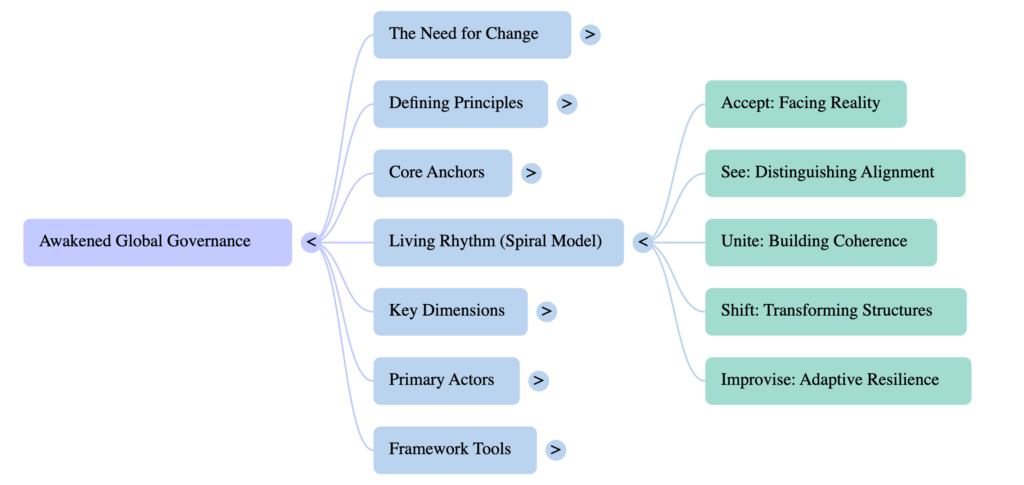
Where the anchors provide foundation, rhythm provides movement. Awakened Global Governance is not static; it is alive, adapting with clarity while holding coherence across nations, institutions, and peoples. Its rhythm emerges through five living spiral steps that guide collective action in a turbulent and interdependent world.
Accept: Facing Global Reality
Global governance begins with honesty. Accept means recognizing climate collapse, economic inequality, armed conflict, forced migration, and systemic injustice as structural realities rather than isolated crises. By naming these truths, governance clears the illusions that often delay or distort collective response.
See: Distinguishing Alignment from Distortion
See is the discipline of perception — the ability to separate solutions that genuinely serve humanity from those that protect narrow interests. It demands clarity between policies that create fairness and those that disguise exploitation, between agreements that heal and those that merely preserve power.
Unite: Building Coherence Across Systems
No actor can govern the global commons alone. Unite is the rhythm that brings states, intergovernmental organizations, civil society, and private actors into alignment. It calls for frameworks where cooperation overrides rivalry, ensuring that global systems work in coherence rather than fragmentation.
Shift: Transforming Structures, Not Just Outcomes
True governance transformation happens when clarity is embedded into systems. Shift means carrying decisions beyond short-term crisis management into structural change — trade rules that embody fairness, climate compacts that hold accountability, and financial systems that resist manipulation. It is the transition from agreements as documents to governance as systemic harmony.
Improvise: Adaptive Resilience for an Unpredictable Future
The global order evolves faster than institutions can legislate. Improvise ensures governance adapts to turbulence — pandemics, technological disruptions, ecological collapse — without losing integrity. It allows for rapid adjustment while holding onto purpose, so global cooperation remains both flexible and trustworthy.
A Global Rhythm in Motion
Together, these five steps form the living rhythm, a spiral model of Awakened Global Governance. They transform governance from performance into presence, from treaties as signatures into governance as lived stewardship. This rhythm grounds leadership and systems thinking at a planetary scale, allowing humanity to navigate uncertainty with balance, courage, and shared responsibility. It reflects the essence of awakened systemic leadership, aligning multiple actors and frameworks into one coherent rhythm for the global commons.
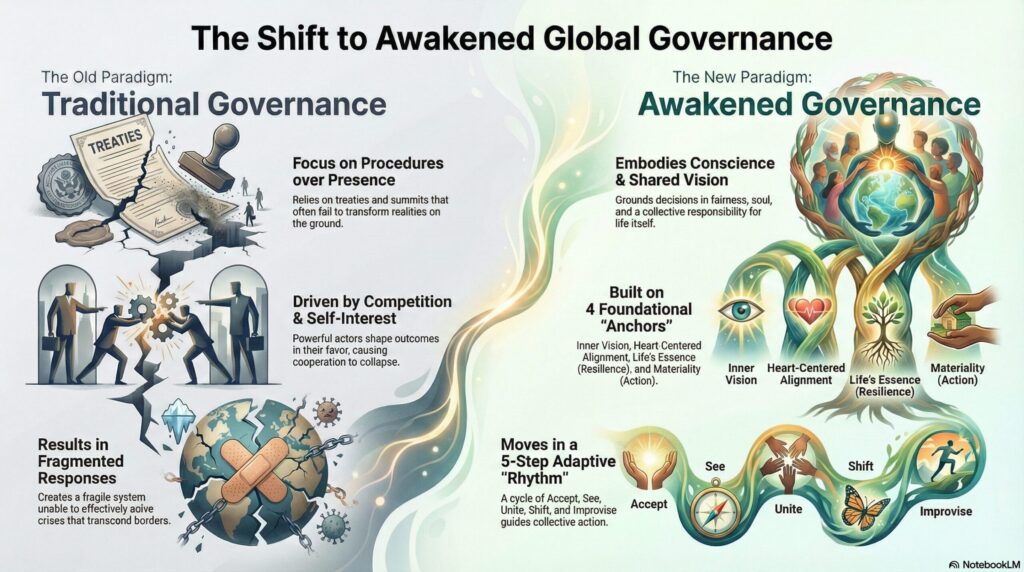
Dimensions of Awakened Global Governance
Awakened Global Governance unfolds not as an abstract vision but as a multidimensional architecture that touches every sphere where humanity’s survival, dignity, and flourishing depend on collective alignment. Each dimension reveals how awakened principles of leadership, clarity, and responsibility anchor into the global commons, creating coherence across states, institutions, governments, and peoples.
Diplomacy and Security
Diplomacy is the first mirror of global governance. Reduced to performance, it sustains rivalry. Awakened, it becomes the architecture of trust. Awakened Global Governance reframes diplomacy as stewardship — negotiations designed to protect life, security frameworks that prioritize stability for all, and agreements that strengthen fairness and accountability. From peace dialogues to arms control, its measure is the dignity it preserves, the trust it builds, and the accountability it sustains.
Global Trade and Economic Systems
Trade agreements and financial structures shape the everyday lives of billions. Awakened Global Governance demands that these frameworks serve more than markets — they must protect workers, sustain economies, and uphold fairness in exchange. Transparency in financial systems, equitable trade rules, and accountability in multinational practices become essential. Here, governance is not a scoreboard of GDPs, but a safeguard for human dignity and shared prosperity.
Human Rights and Justice
Without human rights, global governance loses its soul. Awakened Global Governance makes rights and justice non-negotiable — universal commitments embedded in systems. It addresses damage at its root, where human value losses become the silent cause of wider collapse. From international courts to refugee protections, from digital rights to freedom of expression, this dimension ensures that individuals remain at the center of global cooperation. Justice becomes more than a legal mechanism; it is a lived ethic guiding nations and institutions alike.
Environmental Protection and Climate Action
No global challenge carries more urgency than the climate crisis. Awakened Global Governance holds ecological balance as a foundational principle, embedding it into treaties, compacts, and enforcement mechanisms. Sustainability is treated as a duty, ensuring forests, oceans, and air are safeguarded as commons for all life. Climate governance in this dimension becomes a shared survival pact binding present and future generations.
Migration and Public Health
Movement of people and the health of populations expose the deep interdependence of nations. Awakened Global Governance ensures that migration policies respect dignity, protect rights, and prevent exploitation, while global health systems coordinate to respond to pandemics and crises with speed and integrity. Public health and human mobility are upheld as shared responsibilities, stewarded with compassion, fairness, and accountability.
Knowledge, Technology, and Innovation
While not the center of global governance, technology is an inseparable strand. Awakened Global Governance guides innovation through conscience, ensuring that AI, biotechnology, and emerging tools serve humanity rather than destabilize it. International standards, ethics councils, an awakened global council of conscience, and cooperative research become channels to align intelligence with life, preventing fragmentation and exploitation while amplifying creativity and resilience.
The Interconnected Whole
These dimensions reveal that global governance cannot survive as separate silos of climate, trade, rights, or health. Awakened Global Governance weaves them into one rhythm, guided by the philosophy, model, and decision frameworks of Awakened Leadership. It ensures that diplomacy aligns with climate compacts, that trade protects human rights, and that security safeguards dignity.
This is systemic alignment, a living constitution for global governance, remembered not only in books but carried through the coherence of institutions, governments, leaders, and civil societies. Through these dimensions, Awakened Global Governance rises as more than the management of crises. It becomes the embodiment of humanity’s collective responsibility to lead with truth, courage, and shared purpose.
The Role of Institutions, Governments, and Actors in Awakened Global Governance
Awakened Global Governance is not the work of a single body. It is a living field shaped by the interaction of states, institutions, and societies, each carrying responsibility for the whole. When these actors operate with awakened clarity, they form the architecture of coherence that holds the global community together.
Institutions: The Global Frameworks of Cooperation
International organizations such as the United Nations, the European Union, the African Union, and regional alliances provide the scaffolding for cooperation. Their strength lies not in the volume of resolutions passed, but in their ability to uphold integrity, enforce agreements, and mediate disputes with fairness and courage. Institutions embody the continuity of governance, ensuring that rules and norms remain reliable reference points for nations and peoples alike.
Governments: Stewards of Collective Responsibility
National governments remain the primary actors in global governance. They hold the power to commit resources, ratify treaties, and implement policies that shape the fate of humanity beyond borders. In awakened governance, states act not as isolated competitors but as stewards of shared responsibility, placing global trust on par with national interest. Their leadership is measured by the courage to make decisions that serve both their citizens and the wider human community. Not me first, but we first.
Civil Society and NGOs: Voices of Accountability
Civil society groups, humanitarian organizations, and NGOs bring urgency and truth into the global conversation. They amplify the concerns of those most affected by crises — refugees, vulnerable populations, and communities on the frontlines of climate and conflict. In awakened governance, their role is not peripheral but central, ensuring that governance remains human-centered and deeply accountable.
Private Sector and Business: Innovation with Integrity
The private sector drives much of the world’s economic and technological activity. In awakened governance, businesses become partners in stewardship rather than engines of unchecked growth. Their responsibility extends to transparent supply chains, ethical innovation, and contributions to sustainability. When corporations align profit with purpose, they help stabilize financial systems, strengthen trust, and channel innovation toward collective good.
The Collective Role of Actors
Awakened Global Governance recognizes that no single entity can uphold global order. States bring authority, institutions provide structure, civil societies contribute conscience, and businesses carry innovation and resources. Each actor holds a distinct responsibility, yet only in their collective role can coherence emerge. This alignment ensures that governance becomes not a scattered effort but an integrated architecture capable of addressing humanity’s most urgent and long term challenges.
Awakened Diplomacy: The Connector of Global Governance
Diplomacy remains the living bridge of global governance. It is through dialogue that nations, institutions, and communities translate vision into action. Yet in its conventional form, diplomacy often becomes negotiation for advantage rather than stewardship of shared futures. Awakened Diplomacy restores its original purpose — the art of coherence, trust, and alignment among diverse actors.
As part of Awakened Global Governance, diplomacy is no longer confined to tables of negotiation but extends into the daily rhythm of cooperation between governments, civil society, and global institutions. It connects the threads of AI governance, political governance, and systemic governance into one field of responsibility, ensuring that every sphere moves with integrity rather than rivalry.
Awakened Diplomacy is thus not performance, but presence. It redefines dialogue as a living force rooted in human values and collective purpose, making it the connector that holds the architecture of global governance together.
The Awakened Leadership Compass: A Tool for Global Systems
Awakened Global Governance is larger than any single instrument, yet its embodiment has already begun to take form through the Awakened Leadership Compass. Emerging as the first tool of its kind, the Compass offers a way of translating awakened leadership into research and analysis, helping leaders and institutions navigate complexity with greater clarity. It is not the sole channel of this awakening, but one living application already in motion.
As a guidance framework, the Compass supports work on disputes, treaties, humanitarian crises, economic stability, and security dilemmas. It is designed not as a rigid manual but as a reflective lens, enabling decision-makers to see alignment where confusion dominates, to test policy against fairness, and to approach crises from coherence rather than reaction.
Rooted in the philosophy, model, and decision frameworks of Awakened Leadership, the Compass evolves alongside the movement itself. It stands as both a gift and a responsibility: a living reminder that global governance must carry presence, integrity, and vision into every decision shaping humanity’s future.
Conclusion: The Awakening of Global Governance
Awakened Global Governance is more than the reform of international institutions or the renewal of treaties. It is the conscious re-foundation of how humanity organizes itself on a planetary scale. It binds nations, organizations, and communities in a shared rhythm where cooperation replaces rivalry and stewardship replaces performance.
Rooted in the Awakened Leadership Model, guided by the Decision Framework, and carried by the Awakened Leadership Movement, this vision does not treat climate, trade, security, rights, or migration as isolated challenges. It holds them as interconnected responsibilities of one human family, demanding coherence across every system that governs life.
SunDeep Mehra, Global Pioneer of Awakened Leadership and founder of the Movement, has given voice to this shift. His work reminds governments, institutions, individuals, and global actors that the survival of our world cannot rest on compliance alone. It requires awakening, a leadership that carries soul into systems and clarity into action.
Awakened Global Governance calls us to hold the Earth not as a resource but as a trust, to see people not as populations but as dignity embodied, and to treat governance not as procedure but as presence. In this awakening, the path forward is clear: global leadership rooted in truth, responsibility, and shared purpose.
Walk with this awakening. Connect with SunDeep Mehra on X and LinkedIn, explore the Awakened Leadership Movement at sundeepmehra.com, and subscribe to the newsletter, becoming part of a living channel where global governance continues its journey into an awakened future.








